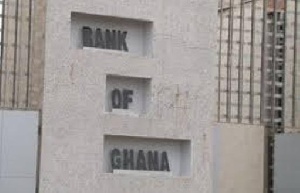 Ghana's Central Bank, Bank of Ghana
Ghana's Central Bank, Bank of Ghana
Ghana’s Central Bank could slash further its benchmark interest rate to as low as 17.50 per cent by the end of this year, investment firm, InvestCorp is predicting.
With inflation trending downwards (13.2 per cent) and expected to drop further, the development should help spur lending and business activity as the cost of doing business will come go down drastically.
The Bank’s Monetary Policy Committee (MPC) recently cut the policy rate by 200 basis points to 23.5 per cent, the biggest cut in more than a decade.
The reduction, economists say serves President Nana Akufo-Addo's purpose as he’s bent on finding ways to stimulate private sector growth.
Commenting InvestCorp said “the decision by the rate setting committee of the Bank of Ghana to reduce the country’s Monetary Policy Rate (MPR) by 200 basis points to 23.5 percent should set-in a policy easing cycle for the Ghanaian economy. This rate cut occurred after the authorities kept the MPR steady since November 2016, and CPI inflation declined from a recent peak of 19.2 percent (March 2016) to 13.2 percent in February 2017.”
It added that “in our view this decision should support the prevailing positive consumer and business sentiment, support the tax reliefs and the strong growth recovery signal in the 2017 budget statement and help re-align the MPR to inflation expectations.”
It said while the rate cut has signaled an easing cycle, it thinks the committee must also align rates to its own announced inflation expectations, adding the spread between the bank’s policy rate of 23.5 percent and expected inflation over a 12 month period of 11.5 per cent must reduce.
Economist, Dr Lord Mensah with the University of Ghana Business School maintains that the prediction is spot on since the posture of the new government is one that is more likely to engender a friendlier business operating environment.
“From all indications, this government is production–minded and should we continue to produce locally at least 50per cent of what we import, it will reduce inflation considerably and therefore reflect on a downward trend of the policy rate of the Central bank,” he explained.
According to him for a government that remains concerned about the prudent management of the country’s finances, it is unlikely to go on a borrowing spree.
Dr Mensah further pointed out that businesses will take advantage of lower interests charged on loans as a result of the reduced benchmark interest rate of the BoG and be able to expand and “that will also mean they will hire more labour and so people will be employed.”
InvestCorp hoped measures would be taken to improve the efficiency of the forward guidance process as the signal of monetary policy easing and the re-alignment of the policy rate to inflation expectations is essential for growth recovery for Ghana. It explained further that the measures will also help lower short term treasury yields and rollover cost based on the prevailing yield curve.
There has been renewed business and consumer confidence on the back of fiscal policy measures announced in the 2017 budget, but concerns over high cost of credit and high NPLs for Ghana remain endemic. The investment firm said “while the immediate impact of the rate cut will be minimal, it will help start the process of monetary policy adjustments that will synchronise the stance of both fiscal and monetary policy. We see this as important in building analyst confidence in a stronger recovery of the real sector.”
The cut in the policy rate has already witnessed a downward adjustment in the base rates of some banks.